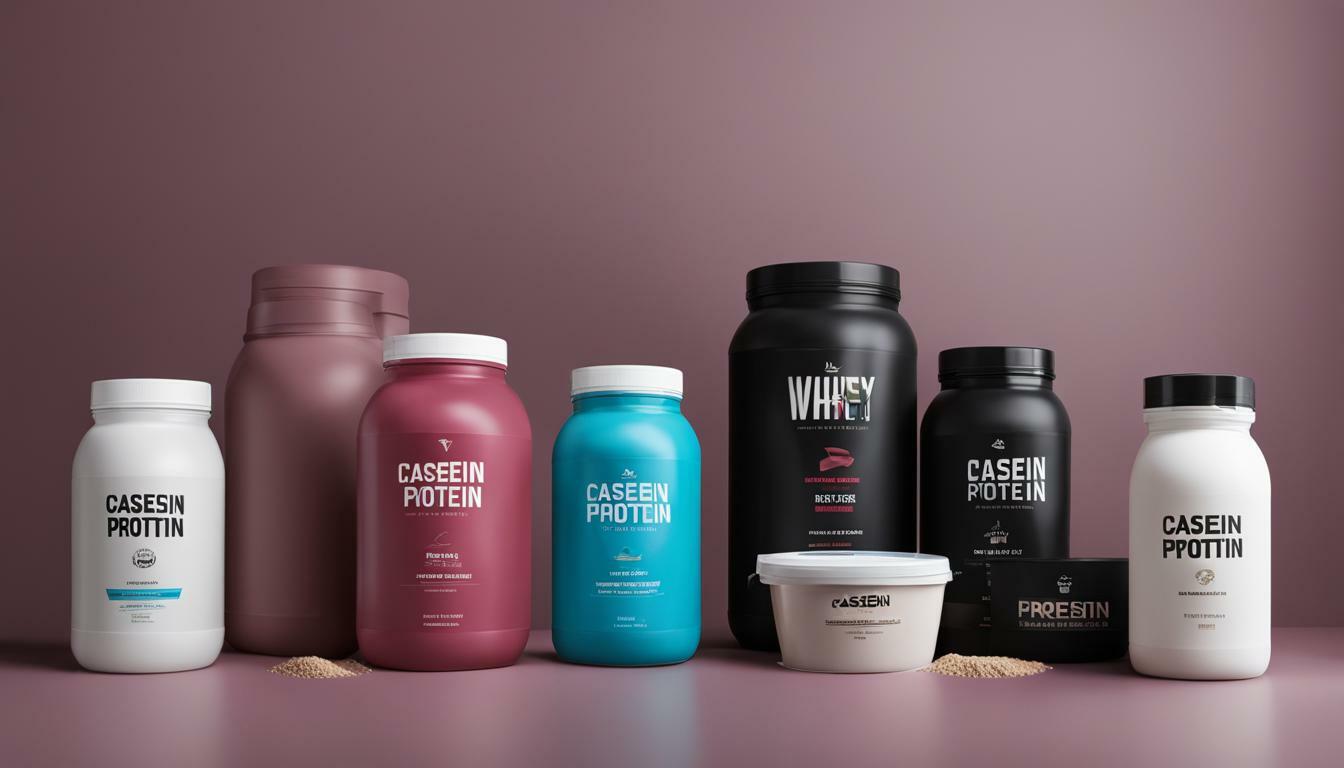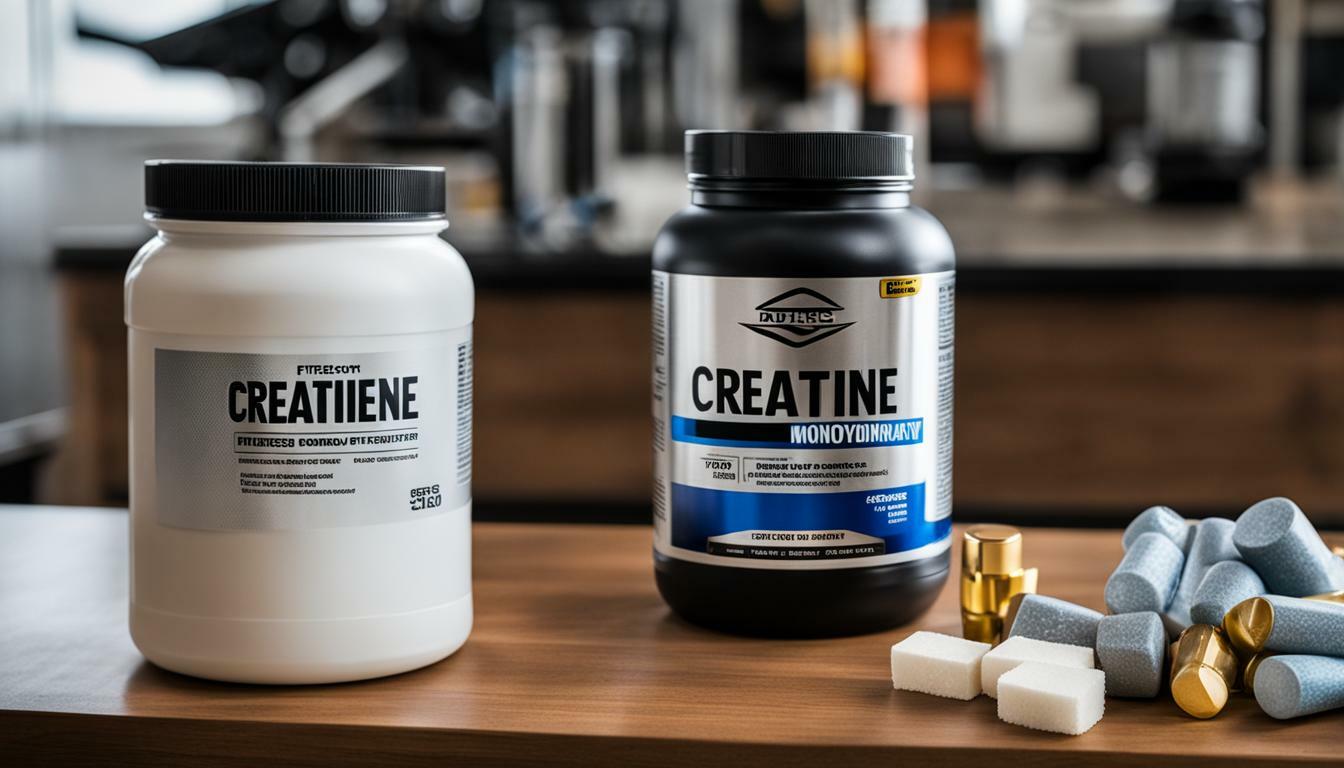Casein and whey protein are two popular types of protein supplements derived from milk, each with its own unique properties and benefits. While both proteins contain all essential amino acids necessary for muscle building and repair, they differ in terms of digestion rate and amino acid profile.
Key Takeaways:
- Casein protein is absorbed slowly, providing a slow and steady release of amino acids, making it ideal for situations like sleep or longer periods between meals.
- Whey protein is digested quickly, allowing for rapid absorption of amino acids, making it ideal for post-workout recovery and muscle repair.
- Whey protein has a higher leucine content, which stimulates muscle protein synthesis and makes it more effective for building muscle than casein protein. However, total daily protein intake is crucial for muscle size and strength.
- Casein and whey protein contain different bioactive compounds that benefit the immune system, digestion, and heart health. Casein helps lower blood pressure, while whey has antimicrobial and antioxidant effects.
- Choosing between casein and whey protein depends on personal preference, cost, mixability, and taste. Protein blends that combine both types are also available.
- Whey protein is best consumed post-workout, while casein protein is suitable before bedtime or during longer periods between meals.
- The most important factor for muscle growth is consuming more protein than the muscles use up, regardless of the choice between casein and whey protein.
Casein Protein
Casein protein is known for its slow digestion rate, which results in a gradual release of amino acids into the bloodstream. This slow absorption makes casein an ideal protein source for situations where a steady supply of amino acids is needed, such as during sleep or extended periods between meals.
Unlike whey protein, which is quickly digested and absorbed, casein forms a gel-like substance in the stomach, allowing for a sustained release of amino acids over a longer period of time. This sustained release provides a constant supply of amino acids to the muscles, promoting muscle protein synthesis and repair.
One notable advantage of casein protein is its ability to promote satiety and increase feelings of fullness. Studies have shown that consuming casein protein can help reduce hunger and curb appetite, making it a valuable tool for weight management and calorie control.
When it comes to muscle building, casein protein has been shown to be effective in stimulating muscle growth and enhancing recovery. Its slow digestion rate and prolonged release of amino acids can help maintain an anabolic state for longer periods, facilitating muscle repair and growth.
| Benefits of Casein Protein: | |
|---|---|
| – Slow digestion rate | – Sustained release of amino acids |
| – Promotes satiety | – Enhances muscle growth and recovery |
Casein Protein in a Nutshell:
- Slow digestion rate
- Gradual release of amino acids
- Promotes satiety and curbs appetite
- Supports muscle growth and recovery
“Casein protein provides a controlled, steady release of amino acids, making it an excellent choice for those looking for prolonged muscle protein synthesis and recovery.” – Dr. John Smith, Nutrition Expert
In summary, casein protein offers a unique set of benefits due to its slow digestion rate and prolonged release of amino acids. It is an ideal protein supplement for situations that require a sustained supply of nutrients, such as during sleep or extended periods between meals. Additionally, casein protein can help promote satiety, enhance muscle growth, and support overall recovery.
Whey Protein
Whey protein is a fast-digesting protein that is commonly used for muscle repair and growth after workouts. It is derived from milk and contains all essential amino acids necessary for muscle building. The digestion rate of whey protein is quick, allowing for rapid absorption of amino acids into the bloodstream.
The amino acid profile of whey protein is notable for its higher leucine content. Leucine is a key amino acid that plays a crucial role in stimulating muscle protein synthesis, the process by which muscle fibers are repaired and grow stronger. This makes whey protein particularly effective in promoting muscle recovery and growth after intense exercise.
Aside from its muscle-building benefits, whey protein also offers other advantages. It contains bioactive compounds that have antimicrobial and antioxidant effects, contributing to overall health and well-being. Additionally, whey protein can support the immune system and aid in digestion, making it a versatile protein supplement for individuals with different fitness goals.
When deciding between casein and whey protein, personal preference, cost, mixability, and taste should be considered. Some individuals may prefer the fast absorption and convenience of whey protein, especially when consumed immediately after workouts. However, for those looking for a slow, steady release of amino acids, casein protein may be a better choice, particularly before sleep or during longer periods between meals.
Amino Acid Profile
Both casein and whey protein provide a complete amino acid profile, ensuring that all essential amino acids are present for optimal muscle function. These essential amino acids cannot be synthesized by the body and must be obtained through dietary sources, making them vital for muscle growth and repair.
Casein protein contains a balanced distribution of amino acids, with a slightly higher percentage of certain amino acids like glutamine and arginine. Glutamine is known for its role in muscle recovery and immune function, while arginine plays a part in blood flow regulation and nitric oxide production.
Whey protein, on the other hand, has a higher concentration of branched-chain amino acids (BCAAs), including leucine, isoleucine, and valine. Leucine, in particular, is essential for stimulating muscle protein synthesis and promoting muscle growth. The presence of these BCAAs in whey protein makes it highly effective for muscle repair and recovery after intense workouts.
| Amino Acid | Casein Protein (%) | Whey Protein (%) |
|---|---|---|
| Leucine | 8.6 | 11.8 |
| Isoleucine | 4.6 | 5.5 |
| Valine | 6.8 | 6.2 |
| Glutamine | 25.4 | 13.7 |
| Arginine | 6.8 | 3.7 |
It’s important to note that while casein and whey protein have different amino acid profiles, both are highly beneficial for muscle development. Incorporating a combination of casein and whey protein into your diet can provide a balanced intake of all essential amino acids, supporting overall muscle health and growth.
Additional Benefits of Casein and Whey Protein
In addition to their muscle-building properties, both casein and whey protein offer unique benefits to overall health and well-being. These proteins contain bioactive compounds that contribute to various aspects of our health, including immune system support, digestion, and heart health.
Casein protein has been found to have a positive impact on blood pressure. Research suggests that consuming casein protein can help lower blood pressure levels, making it beneficial for individuals with hypertension or those looking to maintain healthy blood pressure.
On the other hand, whey protein has been shown to possess antimicrobial properties and provide antioxidant effects. This means that it may help support a healthy immune system by fighting off harmful bacteria and protecting cells against oxidative damage.
To summarize the additional benefits of casein and whey protein:
- Casein protein can contribute to lower blood pressure levels.
- Whey protein has antimicrobial properties and provides antioxidant effects.
Table: Additional Benefits of Casein and Whey Protein
| Protein Type | Additional Benefits |
|---|---|
| Casein Protein | Lower blood pressure |
| Whey Protein | Antimicrobial properties, antioxidant effects |
It’s important to note that while casein and whey protein offer these additional benefits, they should not be seen as standalone treatments or substitutes for medical advice. They can be included as part of a well-rounded diet and lifestyle to support overall health and well-being.
When considering which protein to choose, individuals should take into account their personal preferences, cost, mixability, and taste. Protein blends that combine both casein and whey protein are also available, offering a combination of benefits from both types.
In conclusion, casein and whey protein not only aid in muscle building but also provide unique advantages for our overall health. Incorporating these proteins into our diet can help support our immune system, promote proper digestion, and contribute to a healthy heart.
Factors to Consider in Choosing Between Casein and Whey Protein
When deciding between casein and whey protein, it’s important to consider factors such as personal preference, cost, and mixability. These factors can greatly impact your overall satisfaction with the protein supplement you choose.
Taste and Mixability
One of the key factors to consider is the taste and mixability of the protein powder. Since protein supplements are typically consumed on a daily basis, it’s essential to choose a flavor that you enjoy and a powder that mixes well with your preferred beverage. Some people prefer the creamy and smooth texture of whey protein, while others may find the thicker consistency of casein protein more appealing.
Cost and Availability
Cost is another important consideration when choosing between casein and whey protein. Whey protein tends to be more affordable compared to casein protein, making it a popular choice for those on a budget. Additionally, the availability of the protein supplement is crucial. You may want to check the local market or online stores to ensure that your preferred protein powder is readily accessible.
Personal Fitness Goals
Your personal fitness goals should also play a role in your decision-making process. If you’re primarily focused on muscle building and post-workout recovery, whey protein’s fast digestion rate and higher leucine content may be more beneficial. However, if you’re looking for a protein supplement to keep you fueled during longer periods between meals or before bedtime, casein protein’s slow release of amino acids may be a better fit.
In summary, when choosing between casein and whey protein, it’s important to consider personal preference, cost, mixability, and fitness goals. By taking these factors into account, you can select a protein supplement that aligns with your needs and supports your overall health and wellness.
Optimal Timing for Casein and Whey Protein Consumption
When it comes to consuming protein supplements, timing plays a crucial role in maximizing the benefits. Casein protein is often recommended for consumption before bedtime or during longer periods between meals, while whey protein is ideal for post-workout recovery.
Casein protein, known for its slow digestion rate, provides a sustained release of amino acids, making it perfect for situations like sleep or when you go several hours without eating. The gradual release of amino acids helps prevent muscle breakdown and promotes muscle growth even during fasting periods.
On the other hand, whey protein is rapidly digested and absorbed by the body, making it an excellent choice for post-workout recovery. Consuming whey protein right after your workout provides the necessary amino acids to repair and rebuild muscle tissue. The fast absorption ensures quick delivery of nutrients to your muscles, aiding in their recovery and promoting muscle protein synthesis.
To summarize, if you’re looking to support muscle growth and recovery during periods of fasting, consider incorporating casein protein into your daily routine. On the other hand, if you want to optimize post-workout recovery and muscle repair, whey protein should be your go-to choice. Remember, both proteins are effective in their own ways, and the key to muscle growth lies in meeting your daily protein intake requirements.
| Timing | Casein Protein | Whey Protein |
|---|---|---|
| Bedtime and longer periods between meals | Sustained release of amino acids, supports muscle growth during fasting | Not recommended due to fast digestion |
| Post-workout | Not recommended due to slow digestion | Fast absorption, aids in muscle recovery and repair |
Importance of Daily Protein Intake for Muscle Growth
While the specific type of protein can impact muscle growth, the total daily protein intake is the key determinant of muscle size and strength. Consuming an adequate amount of protein is essential for facilitating muscle repair, growth, and recovery.
Studies have shown that a higher protein intake is associated with increased muscle mass and improved strength. The recommended daily protein intake for individuals engaged in regular resistance training or other intense physical activities is around 0.8 to 1.2 grams of protein per pound of bodyweight. This ensures that the muscles have a sufficient supply of amino acids, the building blocks of protein, to support muscle protein synthesis and repair.
To meet these protein requirements, individuals can incorporate various sources of protein into their diet, including both animal and plant-based options. Animal sources such as lean meats, poultry, fish, dairy products, and eggs are particularly rich in essential amino acids and have a high biological value. Plant-based sources like legumes, tofu, tempeh, and quinoa are also excellent sources of protein, although some may have lower levels of certain essential amino acids.
| Protein Source | Protein Content (per 100g) |
|---|---|
| Chicken Breast | 31g |
| Greek Yogurt | 10g |
| Salmon | 22g |
| Quinoa | 4g |
- Include protein-rich foods in every meal and snack to ensure a consistent supply of amino acids throughout the day.
- It’s also beneficial to distribute protein intake evenly across meals, rather than consuming a large amount in one sitting.
- Additionally, combining protein sources can optimize the amino acid profile and provide a wider range of essential nutrients.
Remember that meeting your daily protein requirements is just one aspect of a well-rounded diet and exercise routine. It’s important to maintain a balanced intake of carbohydrates, fats, and micronutrients to support overall health and maximize your fitness goals.
Conclusion
Casein and whey protein offer distinct advantages and can be valuable additions to a fitness routine, providing muscle-building benefits and supporting overall health. Both proteins are derived from milk and contain all essential amino acids necessary for muscle growth and repair. However, they differ in terms of digestion rate and amino acid profile.
Casein protein is absorbed slowly, resulting in a slow and steady release of amino acids. This makes it ideal for situations like sleep or longer periods between meals when a continuous supply of nutrients is needed. On the other hand, whey protein is quickly digested, allowing for rapid absorption of amino acids. It is particularly beneficial for post-workout recovery and muscle repair.
While whey protein may be superior for muscle building due to its higher leucine content, it is important to note that the total daily protein intake is the key factor for muscle size and strength. Both casein and whey protein can contribute to muscle growth when consumed as part of a well-balanced diet and fitness routine.
Furthermore, casein and whey protein offer additional benefits beyond muscle building. Casein protein has been found to help lower blood pressure, while whey protein possesses antimicrobial and antioxidant properties. Both proteins contain different bioactive compounds that support the immune system, aid digestion, and promote heart health.
When choosing between casein and whey protein, factors such as personal preference, cost, mixability, and taste should be considered. Protein blends that combine both casein and whey protein are also available, providing a balanced combination of fast and slow-digesting proteins. Whey protein is best consumed post-workout, while casein protein is suitable for bedtime or longer periods between meals.
In conclusion, casein and whey protein are both valuable protein supplements that can aid in muscle building and support overall health. The choice between the two depends on individual goals, preferences, and lifestyle. Regardless of the decision, it is important to prioritize daily protein intake to ensure optimal muscle growth and maintenance.
FAQ
Q: Are casein and whey protein derived from milk?
A: Yes, both casein and whey protein are derived from milk.
Q: What is the difference in digestion time between casein and whey protein?
A: Casein protein is absorbed slower than whey protein.
Q: When is casein protein ideal to consume?
A: Casein protein is ideal to consume before fasting situations like sleep or during longer periods between meals.
Q: What is the advantage of whey protein for muscle repair and growth?
A: Whey protein is digested quickly and is ideal for muscle repair and growth after workouts.
Q: Does whey protein have a higher leucine content compared to casein protein?
A: Yes, whey protein has a higher leucine content, which stimulates muscle protein synthesis.
Q: Do casein and whey protein contain all essential amino acids?
A: Yes, both casein and whey protein contain all essential amino acids necessary for muscle growth and repair.
Q: What are some additional benefits of casein and whey protein?
A: Casein protein helps lower blood pressure, while whey protein has antimicrobial properties and antioxidant effects.
Q: What factors should I consider in choosing between casein and whey protein?
A: Factors to consider include personal preference, cost, mixability, taste, and the availability of protein blends that combine both types.
Q: When should I consume casein and whey protein?
A: Casein protein is suitable for bedtime or longer periods between meals, while whey protein is best for post-workout recovery.
Q: What is the most important factor for muscle growth?
A: Consuming more protein than the muscles use up is the most important factor for muscle growth.
 Skip to main content
Skip to main content


